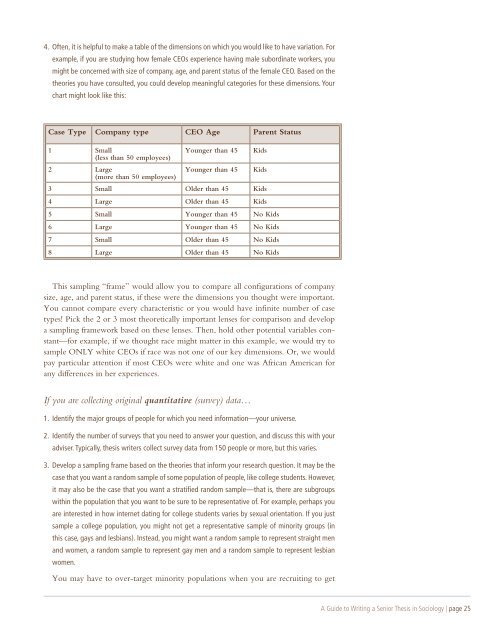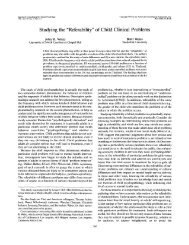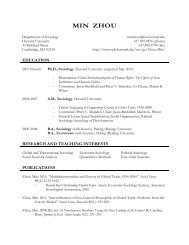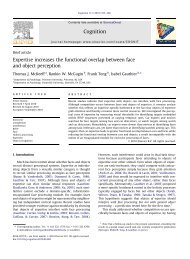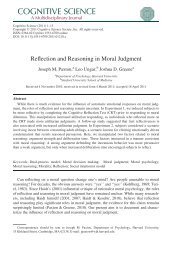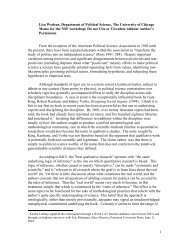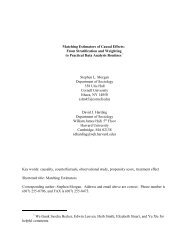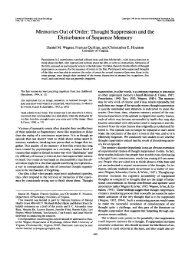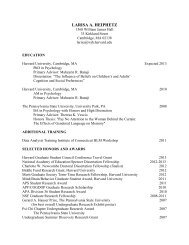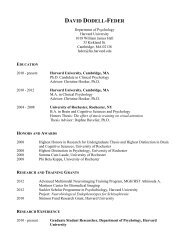A Guide to Writing a Senior Thesis in Sociology - WJH Home Page ...
A Guide to Writing a Senior Thesis in Sociology - WJH Home Page ...
A Guide to Writing a Senior Thesis in Sociology - WJH Home Page ...
Create successful ePaper yourself
Turn your PDF publications into a flip-book with our unique Google optimized e-Paper software.
4. Often, it is helpful <strong>to</strong> make a table of the dimensions on which you would like <strong>to</strong> have variation. For<br />
example, if you are study<strong>in</strong>g how female CEOs experience hav<strong>in</strong>g male subord<strong>in</strong>ate workers, you<br />
might be concerned with size of company, age, and parent status of the female CEO. Based on the<br />
theories you have consulted, you could develop mean<strong>in</strong>gful categories for these dimensions. Your<br />
chart might look like this:<br />
Case Type Company type CEO Age Parent Status<br />
1 Small<br />
(less than 50 employees)<br />
2 Large<br />
(more than 50 employees)<br />
Younger than 45 Kids<br />
Younger than 45 Kids<br />
3 Small Older than 45 Kids<br />
4 Large Older than 45 Kids<br />
5 Small Younger than 45 No Kids<br />
6 Large Younger than 45 No Kids<br />
7 Small Older than 45 No Kids<br />
8 Large Older than 45 No Kids<br />
This sampl<strong>in</strong>g “frame” would allow you <strong>to</strong> compare all configurations of company<br />
size, age, and parent status, if these were the dimensions you thought were important.<br />
You cannot compare every characteristic or you would have <strong>in</strong>f<strong>in</strong>ite number of case<br />
types! Pick the 2 or 3 most theoretically important lenses for comparison and develop<br />
a sampl<strong>in</strong>g framework based on these lenses. Then, hold other potential variables constant—for<br />
example, if we thought race might matter <strong>in</strong> this example, we would try <strong>to</strong><br />
sample ONLY white CEOs if race was not one of our key dimensions. Or, we would<br />
pay particular attention if most CEOs were white and one was African American for<br />
any differences <strong>in</strong> her experiences.<br />
If you are collect<strong>in</strong>g orig<strong>in</strong>al quantitative (survey) data…<br />
1. Identify the major groups of people for which you need <strong>in</strong>formation—your universe.<br />
2. Identify the number of surveys that you need <strong>to</strong> answer your question, and discuss this with your<br />
adviser. Typically, thesis writers collect survey data from 150 people or more, but this varies.<br />
3. Develop a sampl<strong>in</strong>g frame based on the theories that <strong>in</strong>form your research question. It may be the<br />
case that you want a random sample of some population of people, like college students. However,<br />
it may also be the case that you want a stratified random sample—that is, there are subgroups<br />
with<strong>in</strong> the population that you want <strong>to</strong> be sure <strong>to</strong> be representative of. For example, perhaps you<br />
are <strong>in</strong>terested <strong>in</strong> how <strong>in</strong>ternet dat<strong>in</strong>g for college students varies by sexual orientation. If you just<br />
sample a college population, you might not get a representative sample of m<strong>in</strong>ority groups (<strong>in</strong><br />
this case, gays and lesbians). Instead, you might want a random sample <strong>to</strong> represent straight men<br />
and women, a random sample <strong>to</strong> represent gay men and a random sample <strong>to</strong> represent lesbian<br />
women.<br />
You may have <strong>to</strong> over-target m<strong>in</strong>ority populations when you are recruit<strong>in</strong>g <strong>to</strong> get<br />
A <strong>Guide</strong> <strong>to</strong> <strong>Writ<strong>in</strong>g</strong> a <strong>Senior</strong> <strong>Thesis</strong> <strong>in</strong> <strong>Sociology</strong> | page 25


